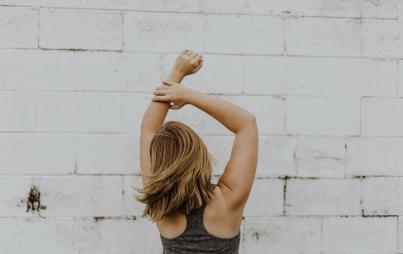
Photo by Arthur Humeau on Unsplash
This article first appeared on Role Reboot and has been republished with permission.
When I heard it, I let it echo again and again in my mind. No one had ever said it quite like that before, nor have they since. I wanted to keep hearing it.
“Kerry loves to love.”
Over a decade later, it’s still among my favorite descriptions of myself. The person who said this doesn’t know me well, yet managed to capture one of the truest parts of who I am. I do, in fact, love to love, and have ever since childhood.
I first remember loving to love when, as a toddler, I became a big sister.
My brother’s birth thrilled me; I felt like my parents had given me my very own piece of creation to adore.
By elementary school, my love extended far beyond family. Every Sunday, I would pray so fervently for hungry strangers around the globe that I made myself cry.
Soon after, I also started to insistently love peers who treated me poorly. I would prioritize these so-called friends without concern for my own well-being. This (rightly) troubled my mother; I now recognize my willingness to tolerate chronic cruelty as an early indicator of my low self-worth.
Anyone can attest that, sometimes, love entails feeling disappointed, angry, or betrayed. Despite learning this early on, I never tried to stop myself from loving. To want the best for, and believe the best in, people felt right. Even at a young age, and in spite of the pain it could cause, loving others made my life feel noticeably full of meaning.
You Might Also Like: It Took Me Years To Realize I Deserve Good Things
Since becoming an adult, the gratification of loving has become even more pronounced. I have been fortunate enough to love my resilient clients I served as an AmeriCorps volunteer; the activists, artists, and academics I came to know while living in Europe and Africa; the high schoolers to whom I teach English in Baltimore City, who I adore so much, I call my lovelies.
In fact, someone recently overheard how many times in the span of a few minutes that I repeated “I love you” at school. Almost exasperated, he said, “Do you love everyone?!”
Although I hold countless others in high regard, and feel considerable fondness for them, I do not love everyone, including one person in particular, for whom I simply cannot muster affection.
Myself.
I have spent most of my life believing that loving myself would not only be selfish, but irresponsible.
Worldwide, so many people need love, and in my eyes, are far more deserving of it than I am; to allocate even a morsel of love for myself would be indulgent.
Now, I recognize this inability to love myself as a combined deficiency of self-esteem and self-compassion. Lacking both of these meant I never saw myself as worthy of my own love. But, through much intention and practice, I am, at last, beginning to recognize my personal value. I am learning how to consider my own needs, and even grant myself permission to meet them. I know, finally, that I deserve good things.
I first began learning how to love myself this time last year — when days darken sooner, and nature burrows into herself. Out of necessity rather than choice, I realized I must do more to care for myself. My long-standing impulse to people-please and prioritize others had finally failed me. Rather than feel satisfaction in serving others, my self-preservation unexpectedly ignited. Instead of simply wanting to keep everyone else happy, something within me started howling to be noticed.
I’m here, too!
Stop neglecting me.
I can’t keep doing this.
I didn’t understand it at the time, but hindsight reveals that I had reached my limit. I could no longer give so much of myself to others with hardly any regard for myself. A primal part of me was demanding, maybe for the first time, self-protection.
“Stop emptying yourself,” it warned me. “It’s going to destroy you.”
A close friend recognized the intense transition I was in, and called this period “molting.” I knew I had to change, to shed myself of what I should no longer carry, but I didn’t know how. I also knew that if I didn’t change, my relationships would devolve; eventually, I would lose the people I love to love.
Although the answer was obvious — start loving myself — the process was foreign. It was like willing myself to fly; just because it would be nice didn’t mean I could make it happen. Eventually, I decided that I could at least start with baby steps.
Maybe I couldn’t love myself yet, but I could be kind to myself.
In increments, that is.
One night, alone in my car, without anyone to distract me from, help me with, or even witness, this moment of vulnerability, I forced myself to find reasons to value who I am. Despite my doubts, I committed to facing, and saying aloud, small, true, possibly forgettable, pieces of myself that make me special.
At the time, I hadn’t yet heard of self-compassion. Looking back, though, I recognize that this practice — of hearing, in my own voice, why I am happy, and even proud, to be me — embodies it. With each reason I told myself why I am grateful to be me, I was showing myself the tenderness I usually reserved for others.
I love that you have only written in purple ink since you were 16 years old.
I love that, during your marathon, you hurt yourself at mile 5, but you kept going for the remaining 21 miles.
I love that your eyes are the same color blue as your grandfather’s.
I love that you let yourself laugh with your lovelies during class.
I love that, twice, you moved across the ocean (alone) for no other reason than it felt right to you.
At first, the reasons surfaced slowly. I had to pause, think, remember. But, as the minutes passed, the moments between each reason diminished. Soon, I was thinking of them so quickly that I was worried I wouldn’t be able to say them soon enough before forgetting the next one. Part of me was astonished that this was me I was talking about, but the reasons were so specific, so nuanced, that there was no way I could have applied them to anyone else. These were real. These were me. And I was showing myself, at last, that I was worthy of my own love.
That night, I understood for the first time that learning to love myself wouldn’t be selfish, irresponsible, or indulgent.
It wouldn’t detract from how much I love others. In fact, finally acknowledging my worth rejuvenated me. I felt inspired. Purposeful. Grateful.
My lack of self-love had never stopped me from loving anyone else, but, by loving myself, I could now love everyone, and everything, more profoundly.
And I love that.








